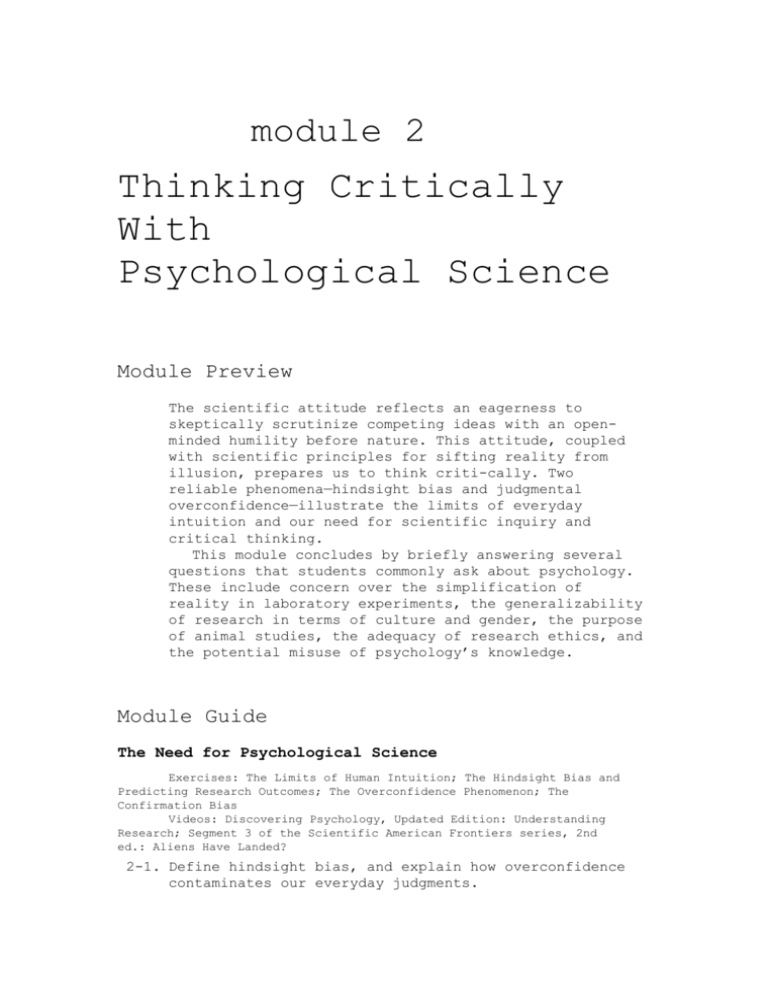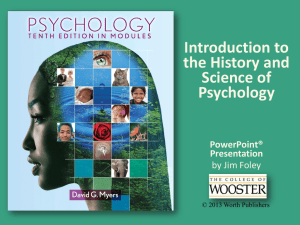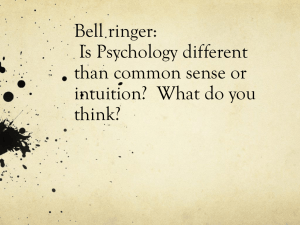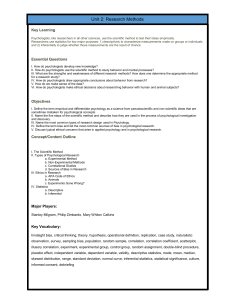module 2 Thinking Critically With Psychological Science Module
advertisement

module 2 Thinking Critically With Psychological Science Module Preview The scientific attitude reflects an eagerness to skeptically scrutinize competing ideas with an openminded humility before nature. This attitude, coupled with scientific principles for sifting reality from illusion, prepares us to think criti-cally. Two reliable phenomena—hindsight bias and judgmental overconfidence—illustrate the limits of everyday intuition and our need for scientific inquiry and critical thinking. This module concludes by briefly answering several questions that students commonly ask about psychology. These include concern over the simplification of reality in laboratory experiments, the generalizability of research in terms of culture and gender, the purpose of animal studies, the adequacy of research ethics, and the potential misuse of psychology’s knowledge. Module Guide The Need for Psychological Science Exercises: The Limits of Human Intuition; The Hindsight Bias and Predicting Research Outcomes; The Overconfidence Phenomenon; The Confirmation Bias Videos: Discovering Psychology, Updated Edition: Understanding Research; Segment 3 of the Scientific American Frontiers series, 2nd ed.: Aliens Have Landed? 2-1. Define hindsight bias, and explain how overconfidence contaminates our everyday judgments. The hindsight bias, also known as the I-knew-it-allalong phenomenon, is the tendency to believe, after learning an outcome, that one would have foreseen it. Finding out that something has happened makes it seem inevitable. Thus, after learning the results of a study in psychology, it may seem to be obvious common sense. However, experiments have found that events seem far less obvious and predictable beforehand than in hindsight. Sometimes, psychological findings even jolt our common sense. Our everyday thinking is also limited by our tendency to think we know more than we do. Asked how sure we are of our answers to factual questions, we tend to be more confident than correct. Students’ predictions of their future behaviors are similarly overconfident. Experts’ predictions of world events made with 80 percent confidence were right less than 40 percent of the time. Exercises: A Psychic Reading; Critical Inquiry and Psychology Lectures: Your Teaching Strategies and Critical Thinking; Critical Thinking 2-2. Explain how the scientific attitude encourages critical thinking. The scientific attitude reflects a hard-headed curiosity to explore and understand the world without being fooled by it. The eagerness to skeptically scrutinize competing claims requires humility because it means we may have to reject our own ideas. This attitude, coupled with scientific principles for sifting reality from illusion, helps us winnow sense from nonsense. It carries into everyday life as critical thinking in which we examine assumptions, discern hidden values, evaluate evidence, and assess conclusions. Frequently Asked Questions About Psychology Lectures: Field and Laboratory Experiments 2-3. Explain the value of simplified laboratory conditions in discovering general principles of behavior. The experimenter intends the laboratory experiment to be a simplified reality, one in which important features can be simulated and controlled. The experiment’s purpose is not to re-create the exact behaviors of everyday life but to test theoretical principles. It is the resulting principles—not the specific findings—that help explain everyday behavior. Lectures: Differences in Cultural Norms; Gender Differences 2-4. Discuss whether psychological research can be generalized across cultures and genders. Although culture shapes our specific attitudes and behaviors, the principles that underlie them vary much less. Our shared biological heritage unites us as members of a universal human family. Studying gender differences is not only interesting but also potentially beneficial in preventing conflict and misunderstanding in everyday relationships. It is important to remember, however, that psychologically as well as biologically, women and men are overwhelmingly similar. Exercise: Animal Rights Video: Segment 4 of the Scientific American Frontiers series, 2nd ed.: Return to the Wild Instructor Video Tool Kit: Ethics in Animal Research: The Sad Case of Boee the Chimp; Ethics in Human Research: Violating One’s Privacy; Death of a Subject: The Ethics of Mental Health Research 2-5. Explain why psychologists study animals, and discuss the ethics of experimentation with both animals and humans. Some psychologists study animals out of an interest in animal behaviors. Others do so because knowledge of the physiological and psychological processes of animals enables them to better understand the similar processes that operate in humans. Because psychologists follow ethical and legal guidelines, animals used in psychological experiments rarely experience pain. The debate between animal protection organizations and researchers has raised two important issues: Is it right to place the well-being of humans above that of animals, and what safeguards are in place to protect the well-being of animals in research? Many professional organizations and funding agencies have developed extensive guidelines for the humane use of animals. Ethical principles for the treatment of human participants urge investigators to obtain informed consent, protect subjects from harm and discomfort, treat information about individuals confidentially, and fully explain the research afterward. Lectures: Invasion of Privacy; Research Ethics; Psychology and Human Values; Interrogations and the Use of Torture; The Instructor’s Perspectives and Values Exercise: Observing Versus Interpreting 2-6. Describe how personal values can influence psychologists’ research and its application, and discuss psychology’s potential to manipulate people. Psychologists’ values can influence their choice of research topic, their theories and observations, their labels for behavior, and their professional advice. Knowledge is power that can be used for good or evil. Applications of psychology’s principles have so far been mostly for the good, and psychology addresses some of humanity’s greatest problems and deepest longings.







